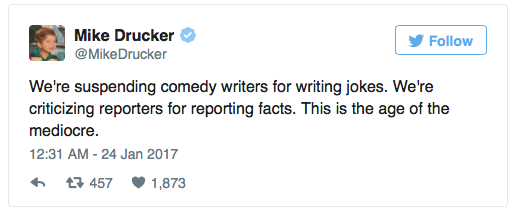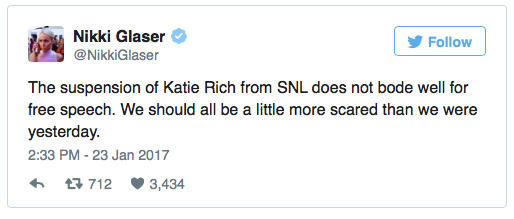Today I get to talk about someone good! This is exciting.
You may have heard about Stephen Colbert’s trouble with the FCC over his Trump joke:
The only thing your mouth is good at is being Vladimir Putin’s cock holster.
I’d like to address something quickly here. I’ve watched Stephen Colbert since the Strangers With Candy Days. The Even Stephen Days. Folks saying this joke is homophobic…that doesn’t seem to be true to me. If Vladimir Putin were a woman, and if the joke was about Trump going down on her, I think that joke would still be made.
The joke, to me, is about Trump loving Vladimir Putin. Not about Trump giving blowjobs.
That said, there’s a history of calling people gay as an insult, and while that’s probably not the joke’s intent, it’s going to hit that nerve for some people.
Then there’s also the valid argument, “Cock holster” is a pretty funny phrase. Which sounds like a joke, but it’s not. I’m serious about that being funny, and that is meaningful. Offensive material created for a comedy show, said in a comedy setting, is something that, to me, is not only acceptable, but important to argue for.
Anyway, I don’t find it offensive, personally, and I’m not here to claim offense on behalf of anyone else. I’m here to highlight this example of a case where “freedom of speech does not mean freedom from consequence” is a terrible ideal.
I can’t tell you how many times I’ve heard the phrase “freedom of speech does not mean freedom from consequences.”
I’m very against that phrase. Because it’s vague. Who decides something warrants consequence? What are the consequences? Who decides on them? When is enough enough? What does a joke like Colbert’s warrant in terms of possible punishment? Which speech is subject to consequence and which isn’t? There is no rulebook here, and yet we’re punishing people as if there is. When we use the phrase “freedom of speech does not mean freedom from consequence” we are endorsing this exact thing, punishment applied by nobody in particular, brought down for things that are not clearly outlined.
Let’s look at another example, the tweet by an SNL writer, the one about Trump’s son being the first homeschool shooter, a tweet that got the writer suspended.
Immediately after the suspension was announced, support came from the comedy community:
And, of course, the writer made one of those stock apologies. I think anyone in comedy should just have one of those written. Save it on your phone so you can publish it whenever something happens.
Frankly, this pissed me off just a bit.
A) This person is a comedy writer. It’s her chosen life path to make fun of people. Sometimes that might be hurtful. Grow the fuck up.
B) The joke was made on her personal twitter account. If SNL doesn’t want that kind of joke on their show, then a tweet is the perfect place for it to live.
C) This comedy writer is constantly being pushed to create funny material and is constantly pushing the boundaries. When that’s what you do, when that’s what you do for a living, there are going to be times you cross a line.
D) While the joke attacks a child, that seems like a line that was drawn after the fact. I don’t remember anyone saying there were meetings amongst the official bosses of comedy saying kids are off limits. It might be in bad taste, but if bad taste is a fire-able offense, someone send Tim Gunn by my workplace sometime.
This writer didn’t break a rule. This writer didn’t say anything that constitutes unprotected speech. This writer didn’t even relate this joke to her job or claim that Lorne Michaels laughed at it. But, if we believe that freedom/consequences line, then her suspension is warranted. Because remember, we don’t make any claims about WHO decides the consequences, WHAT those consequences are, and HOW they should be applied.
If you believe in the freedom/consequences idea, then you have to accept that it’s not just going to apply to people you don’t like and people who say things you don’t like. The unnamed consequences might mean that a real shithead loses his job, and we can all pat ourselves on the back for calling him out so thoroughly, and it might mean that a very funny creator in the world of comedy loses her job too. Because if there are no rules for who gets fired, there are no rules about who can’t be fired either.
Which brings us back to Colbert.
All of a sudden, everyone’s throwing a shit fit. I can’t believe this is happening! FCC investigation? I thought this was AMERICA!
Here’s the deal, folks: Freedom of speech does not mean freedom from consequence. I don’t like that idea, but it is true.
So, while Colbert shouldn’t be thrown in jail, his network can drop him. Sponsors can pull out. The FCC can investigate. Let’s let the FCC make it clear how this works:
The FCC is barred by law from trying to prevent the broadcast of any point of view. The Communications Act prohibits the FCC from censoring broadcast material, in most cases, and from making any regulation that would interfere with freedom of speech. Expressions of views that do not involve a “clear and present danger of serious, substantive evil” come under the protection of the Constitution, which guarantees freedom of speech and freedom of the press and prevents suppression of these expressions by the FCC. According to an FCC opinion on this subject, “the public interest is best served by permitting free expression of views.” This principle ensures that the most diverse and opposing opinions will be expressed, even though some may be highly offensive.
The FCC, however, does have enforcement responsibilities in certain limited instances. For example, the Courts have said that indecent material is protected by the First Amendment to the Constitution and cannot be banned entirely. It may be restricted, however, in order to avoid its broadcast when there is a reasonable risk that children may be in the audience. Between 6 A.M. and 10 P.M. (when there is the greatest likelihood that children may be watching,) airing indecent material is prohibited by FCC rules. Broadcasters are required to schedule their programming accordingly or face enforcement action. Similarly, the Commission has stated that profane material is prohibited between 6 A.M. and 10 P.M.
Finally, the courts have ruled that obscene material is not protected by the First Amendment and cannot be broadcast at any time. For more information about these rules, see our consumer guide.
Isn’t that interesting. So the FCC is saying that they don’t do anything to prevent speech, but they will then come back and enforce responsibilities after the fact. Boy, that sounds a lot like “You can say anything you want. Nothing prevents that. But then you’d better be prepared for the consequences.”
To me, this whole thing speaks to the above tweet regarding mediocrity.
As someone who does some comedic shit, I’m not going to compare myself to Colbert or a professional writer, but I’ll say this: comedy has a terrible risk/reward ratio. You can say something really funny, and someone, somewhere, gets a laugh out of it, a laugh you never hear or know about. But if you say something that turns out to violate some unwritten rules, you’ll hear about it. And hey, maybe someone will even let your boss know about it. Maybe you’ll write a comedic blog and the HR rep from your workplace will comment on it. MAYBE. MAYBE THIS HAS HAPPENED TO SOMEONE SOMEWHERE, SOMEONE YOU’RE READING RIGHT NOW.
It’s my opinion that the result of this is a world of beige. Everything beige. This isn’t diversity, this isn’t respecting difference. It’s making everything a nice, inoffensive beige. Beige comedy. Beige art. Beige food (which I guess includes hummus, which is pretty good). Beige, beige, beige.
Every time I talk about this stuff, I come back to the same thing: Read This Book. Seriously. It will change how you think about everything. If it doesn’t, then I don’t know, send my boss an email, tell her I recommended a horrible book, and recommend that I be fired and that my body be fed through a bookdrop slot. Seems reasonable.



